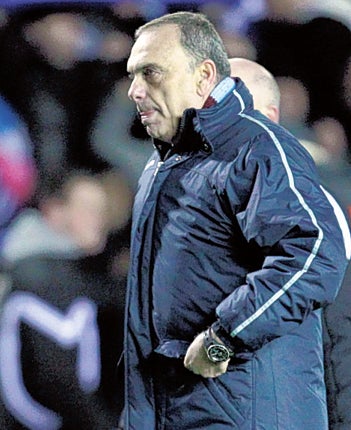Grant's bad luck is only half the tale as he turns to latest dogfight

Your support helps us to tell the story
From reproductive rights to climate change to Big Tech, The Independent is on the ground when the story is developing. Whether it's investigating the financials of Elon Musk's pro-Trump PAC or producing our latest documentary, 'The A Word', which shines a light on the American women fighting for reproductive rights, we know how important it is to parse out the facts from the messaging.
At such a critical moment in US history, we need reporters on the ground. Your donation allows us to keep sending journalists to speak to both sides of the story.
The Independent is trusted by Americans across the entire political spectrum. And unlike many other quality news outlets, we choose not to lock Americans out of our reporting and analysis with paywalls. We believe quality journalism should be available to everyone, paid for by those who can afford it.
Your support makes all the difference.With 11 minutes to go at St Andrew's on Wednesday night, Avram Grant was within sniffing distance of a familiar triumph: the shepherding of a team through the crossfire of politics and discord into a cup final. He has done so with Chelsea and then with Portsmouth; before Roger Johnson headed in a corner, he was set to do so with West Ham. But Johnson's goal, and then another from Craig Gardner, means that it will be Birmingham City in next month's Carling Cup final instead.
So Grant will have no second successive cup final to accompany his probable second consecutive relegation. But do these brave but doomed cup runs suggest that Grant is an unlucky manager? Or does the league stagnation he brings point to a limited coach and motivator?
The defining moment of Grant's managerial career came when John Terry slipped on the sodden Luzhniki turf. He had a penalty kick to win Chelsea the European Cup in 2008 and, had the studs on his standing foot held, Grant would have won a trophy that has eluded the likes of Arsène Wenger, Bobby Robson and Sven Goran Eriksson. Even in extra-time Frank Lampard hit the bar. For Grant not to win that trophy was unfortunate. For him to have taken Chelsea that close, after being asked to fill the deep impression left by Jose Mourinho, was certainly impressive.
His tenure at Portsmouth ended similarly. Again, he was appointed from a director of football role after the dismissal of a popular manager and managed to drag his team to a final, this time of the FA Cup. Facing his former club, Pompey won a first-half penalty. Kevin-Prince Boateng barely made contact with the ball and Petr Cech saved. Of course, it is not certain that Portsmouth would have won had Boateng scored. But it is obviously more likely.
This suggests he is a smart manager who, had things turned out differently, would be hailed as a cup expert. But, balanced against this is a weight of Premier League evidence. He could not improve Chelsea enough to win the title, nor could he drag Portsmouth from the bottom, even factoring in a points deduction. This season he is set to repeat last year's 20th-place finish, with a similarly acceptable squad. When the totality of Grant's record is examined he does not appear to be quite such a bad-luck story. And when the circumstances that made Grant's jobs difficult are examined – the troubled owners, the club politics, the chaos – it must be acknowledged that these were the very reasons that Grant won the job initially. His relationship with crisis is not one-way.
Join our commenting forum
Join thought-provoking conversations, follow other Independent readers and see their replies
Comments